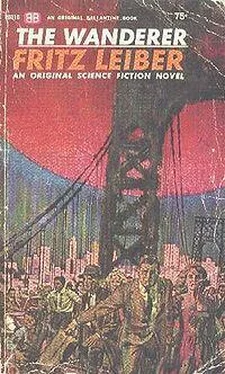Except for the Little Man, everyone stepped back from the gun — even Ragnarok, for the Little Man had dropped the leash as he stared through the fence in scandalized amazement.
“Major!” the Little Man called. “Your conduct is outrageous and inhumane, and I’ll see to it that my opinion goes on record! I’ll have you know that I’m a taxpayer, sir. My money supports installations like Vandenberg Two and pays the salaries of public servants like yourself whether they’re in uniform or not, and no matter how much brass there is on that uniform! You will please reconsider—”
The guard moved toward him. It was clear he wanted this whole problem out of sight before he was alone again. He grated: “Shut up, you, and get moving!” And he lightly prodded the Little Man in the side with the muzzle of his gun.
With a growl like clockwork going out of control, Ragnarok shot from behind the group, leash flirting behind him, and launched himself at the guard’s throat.
The guard’s jump rockets blossomed — as if he had grown a second pair of legs, bright orange — and he lifted into the air, up and back. As he did so, he gave a remarkable demonstration of accurate shooting on the rise, sending four slugs crashing into his attacker. The big German police dog flattened and never moved again.
The group started to run, then stopped.
The guard sailed over the fence and dropped inside, his rockets blossoming briefly to cushion his landing.
The Little Man dropped to his knees beside the body of his dog. “Ragnarok?” He paused, uncertain. Then, “Why, he’s dead,” and his voice was full of bewilderment.
Wojtowicz picked up the aluminum cot and ran forward with it.
“It’s too late for anything,” the Little Man murmured.
“You can’t leave him here,” said Wojtowicz.
They heaved the dead dog onto the cot. The Wanderer was more than bright enough to show the color of blood.
Margo gave Miaow to Paul and took off her jacket and laid it over Ragnarok. The Little Man nodded to her dumbly.
Then the little cortege moved off the way it had come, through the twilight that was flecked with purple and gold.
Young Harry McHeath pointed up over the sea. “Look,” he said. “There’s a white sliver. The moon’s coming out from behind the Wanderer.”
Donald Merriam shivered as he saw the faint black threads joining the nose of the moon to the top of the Wanderer turn bone white — making them suddenly easy to see and more suggestive than ever of a spiderweb.
Then the nose of the moon turned almost glaringly bone white, too: a tiny white crescent that swiftly lengthened and widened. The white threads came out of the white moon-nose and then looped up.
A profoundly disturbing thing about the crescent: as it grew, it seemed to become too convex, as though the moon were tending toward the shape of a football. And this too-convex leading rim wasn’t smooth against black, star-specked space, but just a bit jagged. The boundary between black moon and crescent was a bit jagged, too. Also, there were sharp cracks in the surface of the crescent, as if it were a moon in a Byzantine mosaic.
Suddenly a white glare erupted dazzlingly from starboard into the nose of the Baba Yaga. Reflection from the port rim of the spacescreen almost blinded Don.
He shut his eyes and groped on the rack for a pair of polarizing goggles, put them on and set them to max. Then, with a double puff of the vernier rockets, he swung the ship a shade to starboard.
There, just risen from behind the Wanderer, was the blazing dime beside a sooty dollar. Like the moon and the threads, the Baba Yaga had completed its first passage behind the Wanderer and emerged into sunlight again.
Don adjusted the goggle visors to block off the sun, then cut the polarization until he could see Earth’s night side by Wanderer-light. The eastern third of North America had slipped around the righthand rim into day. All of South America was gone. The rest of the globe was Pacific Ocean, except where New Zealand had started to show on the lower lefthand rim — it would be nightfall there.
Don was startled at how much it warmed his heart to see Earth again — not lost on the other side of the cosmos, but a mere quarter of a million miles away!
New Zealanders and Polynesians ran out from their supper-tables and supper-mats to stare at the prodigy rising with the evening. Many of them assumed the Wanderer must be the moon, monstrously disfigured — most likely by American or Soviet atomic experiments gone out of control — the purple and the gold the aura of a moon-wide atomic blast — and they were hours being argued out of this conviction. But most of the inhabitants of Australia, Asia, Europe, and Africa were still going about their daytime business blissfully unaware of the Wanderer, except as a wild, newspaper-reported Yankee phenomenon, to be classified with senators, movie stars, religious fundamentalism, and Coca-Cola. The shrewder souls thought: Publicity for a new horror film, or — aha — pretext for new demands on China and Russia. No connection was seen — except by a few supersubtle psychologists — between the crazy news stories about the moon and the real enough reports of earthquake disasters.
The Atlantic Ocean was also on Earth’s day side now, but there it was a different story, since most of the craft plying its shipping lanes and airways had observed the Wanderer during the last hours of the night. These furiously searched the static-disturbed wavebands for news and tried to get off reports and requests for advice to owners and maritime authorities. A few headed for the nearest ports. Others, with a remarkably knowledgeable prudence, turned toward the open sea.
The “Prince Charles” suffered a drastic transition. A group of fascistic Brazilian insurgents, with the help of two officers of Portuguese extraction, seized control of the great luxury liner. Captain Sithwise became a prisoner in his own cabin. The plans of the insurgents had been brilliantly conceived, but would probably never have been successful except for the excitement attendant on the “astronomical emergency.” With a feeling almost of awe they realized that, at the expense of six men shot and three of their number wounded, they had gained control not only of a ship big as a resort hotel, but of two atomic reactors.
Wolf Loner breakfasted comfortably and went about his small morning chores as the “Endurance” wested steadily beneath the overcast. His thoughts occupied themselves with the great regularities of nature, masked by modern life.
Don Guiitermo Walker sped in the Araizas’ launch out of Lake Nicaragua into the San Juan River, past the town of San Carlos, as dawn reddened the jungle. Now that the Wanderer was out of the sky, Don Guillermo was less inclined to think about it and about the volcanoes and earthquakes, and more inclined to dwell on his successful bombing of el presidente’s stronghold in the tiny plane that now rested in the bottom of the lake. Sic semper all leftists! At last he had really graduated from the namby-pamby John Birch Society!… or at least that was how Don Guillermo thought of it.
He struck his chest and cried: “ Yo soy un hombre!” One of the Araiza brothers, squinting against the rising sun, nodded and said: “ Si,” but rather unenthusiastically, as if being a man were not quite that grand a matter.
Paul Hagbolt had to admit to himself that walking through sand does get tiring, even when you’re with new friends and under a sky bright with a new planet. The exhilaration of defying Colonel Humphreys and the Moon Project had worn off very quickly, and this backbreaking trudge across the beach seemed peculiarly purposeless and depressing.
Читать дальше










